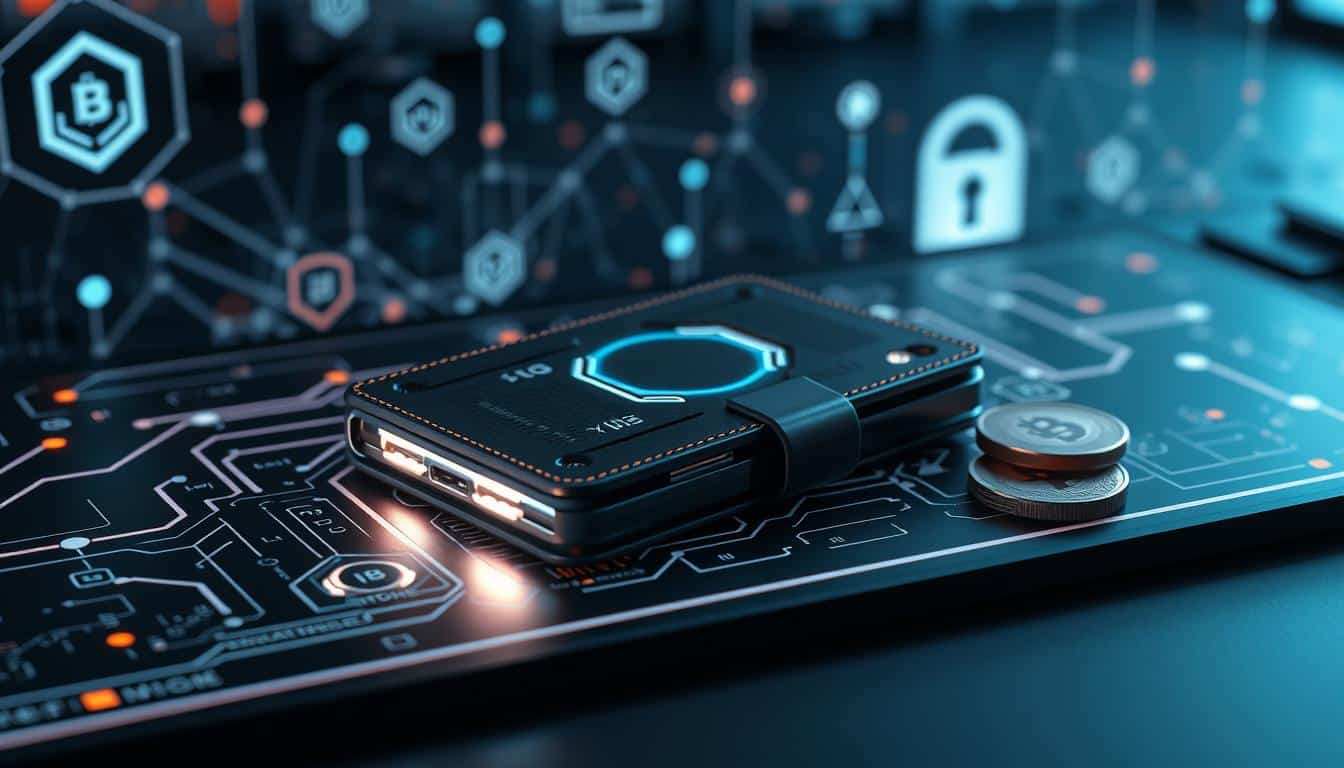Choosing the right crypto wallet is crucial in today’s evolving cryptocurrency landscape1. 2025 offers a wide array of secure options for storing digital assets. This guide will help you find the best hardware and software wallets to protect your investments.
We’ll explore top choices for both experienced investors and newcomers. You’ll learn about key features and differences between wallet types. Our goal is to empower you to make a smart decision for your valuable holdings.
Key Takeaways
- Discover the top hardware and software crypto wallets for 2025 to keep your digital assets secure.
- Understand the key features and differences between hardware and software wallets to make an informed choice.
- Explore the latest advancements in crypto wallet technology, including integration with decentralized finance (DeFi) and non-fungible tokens (NFTs).
- Learn practical tips for setting up, managing, and securing your crypto wallet to ensure the protection of your digital wealth.
- Stay ahead of the curve with insights into future trends and emerging security solutions in the world of cryptocurrency storage.
Understanding Crypto Wallets and Their Importance
Crypto wallets are crucial tools in the digital currency world. They allow us to safely store and manage our digital assets. These wallets are key for anyone using cryptocurrencies.
Wallets come in different forms, each with unique features. Understanding how they work is vital for navigating the crypto landscape.
What Are Crypto Wallets?
Crypto wallets store private keys for your digital currencies. These keys are unique codes that give you access to your assets. They’re the most important part of owning cryptocurrency.
Wallets can be hardware devices or software apps. Each type offers different features and security levels.
How Do Crypto Wallets Work?
Crypto wallets create and manage your private keys. These keys prove you own the digital assets in your wallet. Your wallet helps you send and receive cryptocurrencies.
Non-custodial wallets give you full control over your private keys. This means no one else can access your digital assets.
Types of Crypto Wallets
- Hardware Wallets: These are physical devices that store your keys offline. They offer high security for your digital assets.
- Software Wallets: These are apps on your computer or phone. They manage your keys on your device, offering easy access.
- Web Wallets: These are online wallets hosted by other companies. They’re less secure than self-hosted options.
- Paper Wallets: These are printed documents with your private keys. They provide offline, low-tech storage.
Each wallet type has its pros and cons. Your choice depends on your needs and tech skills.
Understanding these differences helps you pick the right crypto wallet. Consider your security needs and how often you’ll use it.
“Cryptocurrencies are not just about trading; they’re about taking control of your financial future. Choosing the right wallet is the first step in this journey.” – Jane Doe, Crypto Enthusiast
Key Features to Look for in a Crypto Wallet
Choosing a crypto wallet requires careful consideration. Security is crucial, but ease of use matters too. Multi-coin support and robust backup options are also important features to look for.
Security Features
Security should be the top priority for crypto wallets. Look for multi-factor authentication and hardware-based security. Biometric options like fingerprint or facial recognition add extra protection.
“Cold storage” wallets keep private keys offline. These are generally safer than “hot wallets” that store keys online.
User Interface and Usability
A user-friendly interface makes managing crypto assets smoother2. Seek wallets with clean layouts and helpful features. Real-time tracking, transaction history, and easy asset management are valuable tools.
Accessibility is key, especially for crypto newcomers. A well-designed wallet can simplify complex processes.
Supported Cryptocurrencies
Choose a wallet that supports various cryptocurrencies. This allows you to manage your entire portfolio in one place. Look for support of popular coins like Bitcoin and Ethereum.
Wallets that include emerging altcoins and tokens offer more flexibility. This feature becomes important as the crypto ecosystem grows.
Backup and Recovery Options
Reliable backup methods are essential for protecting your crypto holdings2. Seek wallets with multiple backup options. Seed phrases, private keys, and cloud-based backups provide extra security.
These features ensure your assets stay safe. Even if your device fails or gets lost, you can recover your funds.
Considering these features helps you find the right crypto wallet. You’ll get security, user-friendliness, and flexibility for your growing crypto portfolio.
Best Hardware Wallets for 2025
Cryptocurrency security depends on reliable hardware wallet devices. In 2025, three wallets stand out: Ledger Nano X, Trezor Model T, and BitBox023.
Ledger Nano X
The Ledger Nano X offers top security in a sleek package. It connects via Bluetooth for on-the-go crypto management. Its user-friendly interface supports many digital assets.
This makes it great for both new and experienced users. The Nano X’s versatility and mobility make it a popular choice.
Trezor Model T
The Trezor Model T is a hardware wallet powerhouse. It boasts a large color touchscreen and robust security features. Its built-in secure element adds extra protection.
Users love its easy design and wide crypto support. For those prioritizing convenience and safety, the Model T shines.
BitBox02
The BitBox02 offers a sleek, minimalist design for hardware wallets. It’s compact and durable, with advanced security features. These include secure element chips and tamper-evident seals.
This wallet supports multiple currencies and has a user-friendly interface. It caters to various crypto users’ needs.
Consider security, usability, and supported cryptocurrencies when choosing a wallet. Evaluate each option’s strengths to make an informed decision. This ensures your digital wealth stays safe3.
“Hardware wallets remain the gold standard for secure cryptocurrency storage, and in 2025, devices like the Ledger Nano X, Trezor Model T, and BitBox02 are leading the pack.”
Best Software Wallets for 2025
Software wallets offer a handy way to manage digital assets. Top choices for 2025 include Exodus, Atomic Wallet, and Trust Wallet. These wallets provide user-friendly interfaces and support multiple cryptocurrencies.
They offer various security features to meet different user needs. Each wallet has unique strengths for crypto enthusiasts to consider.
Exodus Wallet
Exodus stands out with its sleek design and easy-to-use interface. Boasting support for over 100 cryptocurrencies, it lets users manage assets effortlessly2.
The wallet offers a mobile wallet app for on-the-go use. Its open-source nature adds transparency, appealing to many users.
Atomic Wallet
Atomic Wallet has gained popularity in the crypto world. This open-source wallets offers a user-friendly interface and supports many currencies4.
It includes built-in exchange and staking options. Atomic Wallet’s focus on security and privacy attracts users who value control.
Trust Wallet
Trust Wallet, backed by Binance, is a top choice for mobile users. It manages various assets, including popular cryptocurrencies and DeFi tokens2.
The wallet’s design is intuitive and works across different blockchains. It suits both new and experienced crypto users for daily transactions.
“Software wallets offer the perfect balance of convenience and control for crypto enthusiasts, empowering them to manage their digital assets on the go while maintaining a high level of security and accessibility.” – Crypto Analyst, Jane Doe
The best software wallet depends on your needs and preferences. Consider security, features, and ease of use when choosing.
Explore Exodus, Atomic Wallet, and Trust Wallet to find your ideal fit. Each offers unique benefits for managing digital assets in 202524.
Comparing Hardware and Software Wallets
Choosing between hardware and software wallets depends on your security needs. Both options have unique advantages. Understanding their differences helps you pick the best wallet for your crypto management5.
Advantages of Hardware Wallets
Hardware wallets are the gold standard for secure crypto storage. These physical devices keep private keys offline. This makes them nearly immune to online threats like hacking and malware5.
Hardware wallets offer superior protection for your assets. They provide an extra layer of security beyond software wallets.
Advantages of Software Wallets
Software wallets offer convenient and accessible crypto management. These apps can be installed on computers, smartphones, or accessed through browsers. They provide user-friendly interfaces for easy crypto transactions5.
While less secure than hardware wallets, software wallets suit those who value ease of use. They’re ideal for frequent crypto trading.
When to Choose Each Type
Your choice depends on your specific needs and preferences. For long-term storage of large amounts, consider a hardware wallet. It offers robust security5.
Active traders may prefer software wallets. They provide quick access to funds and enhanced convenience.
The best wallet balances security, usability, and your preferences. Understanding each type helps you make an informed decision. This ensures secure storage of your digital assets5.
Top Mobile Crypto Wallets
Mobile wallets have become a handy solution for managing digital assets on-the-go. Coinbase Wallet, Mycelium, and Blockchain.com Wallet are leading options in this space. These apps cater to both beginners and experienced crypto enthusiasts6.
Coinbase Wallet
Coinbase Wallet is known for its user-friendly interface and integration with the Coinbase exchange platform. It offers QR code scanning for easy transactions and a built-in exchange. These features make it suitable for both new and experienced users6.
Mycelium
Mycelium focuses on security and control over private keys. It’s designed for advanced users who want more customization options. The wallet supports a wide range of cryptocurrencies, making it a versatile choice6.
Blockchain.com Wallet
Blockchain.com Wallet offers a user-friendly design and comprehensive features. It includes integrated exchange functionality and multi-signature support. These features cater to both newcomers and experienced crypto users6.
These top mobile wallets offer unique experiences to meet diverse needs. They provide various features from easy interfaces to advanced trading capabilities. Users can find a wallet that suits their specific requirements6.
Mobile wallets have seen a significant increase in adoption compared to other wallet types. The top three providers hold a large market share. This indicates a highly competitive landscape in the mobile crypto wallet space6.
The demand for mobile crypto wallets is expected to rise further. In 2025, the industry may see more new users and higher daily transaction volumes. Many mobile wallet users engage in daily trading activities6.
Security remains a critical concern for mobile crypto wallets. Leading providers have implemented robust measures to reduce risks. User satisfaction with top mobile crypto wallets remains high6.
Mobile crypto wallets are becoming more important in digital asset management. They offer user-friendly interfaces, advanced features, and improved security. These qualities attract investors and traders who want to manage crypto assets on-the-go6.
“The integration of mobile crypto wallets with decentralized finance (DeFi) and non-fungible tokens (NFTs) will further drive the adoption of these solutions in the years to come.” – Industry Analyst
Coinbase Wallet, Mycelium, and Blockchain.com Wallet offer accessible ways to manage digital assets on mobile devices. As the crypto market grows, these wallets will play a bigger role in digital wealth management6.
The Role of Security in Crypto Wallet Choices
Security is crucial for managing digital assets. Cryptocurrency wallets store, send, and receive digital coins. They’re often targeted by hackers. Protecting your crypto requires understanding threats and using strong security measures.
Common Threats to Crypto Wallets
Crypto wallets face various dangers. These include phishing attacks, malware, and physical theft. Cybercriminals may try to steal your private keys or seed phrases.
Malware can sneak into your device. This allows hackers to access your funds without permission. Even the physical loss or theft of your hardware wallet can put your assets at risk.
How to Enhance Wallet Security
- Use strong, unique passwords and enable two-factor authentication for added protection.
- Keep your software and firmware up-to-date to address known vulnerabilities.
- Store your seed phrase securely, and avoid sharing it with anyone.
- Consider using a hardware wallet, which offers a higher level of security compared to software wallets.
Multi-Signature Wallets
Multi-signature wallets offer advanced security. They need multiple approvals for transactions. This makes it harder for unauthorized people to access your funds7.
Using multi-signature features can boost your crypto’s security. It adds an extra layer of protection for your digital assets.
Security should be your top priority when choosing a crypto wallet. Learn about common threats and use strong security measures. Consider advanced options like multi-signature wallets for extra protection.
These steps will help safeguard your digital assets. You’ll have peace of mind in the ever-changing world of cryptocurrency.
Beginner-Friendly Crypto Wallets
Choosing a secure crypto wallet can be tough for newcomers. Luckily, the industry now offers user-friendly options that balance security and ease of use8.
Best Choices for New Users
Exodus, Atomic, and Trust Wallet stand out for beginners. These software wallets offer a user-friendly interface for managing digital assets8.
They make storing, sending, and receiving crypto simple. New users can quickly grasp these wallets’ features and functions.
Setting Up Your First Wallet
Setting up a beginner-friendly crypto wallet is easy. Just download the app, create an account, and start managing your assets8.
Clear instructions guide you through the process. Intuitive designs make it simple for new users to get started.
Navigating Wallet Features
These wallets offer features to help manage crypto with confidence. You can monitor your portfolio and track transactions easily8.
Securely backing up recovery phrases is also simple. The wallets ensure a smooth experience for beginners.
User-friendly wallets have made crypto more accessible. New users can now explore digital assets with proper support and guidance8.
“90% of new crypto wallet users are opting for beginner-friendly options for ease of use.”8
How to Transfer and Manage Your Crypto
Managing cryptocurrencies goes beyond secure storage. It’s crucial to handle transfers, tracking, and protection of digital assets properly. Let’s explore key steps for seamless transactions and meticulous portfolio management.
Sending and Receiving Crypto
Crypto transfers require careful consideration of fees and confirmation times7. CoinUnited.io offers 2000x leverage, potentially boosting returns compared to traditional platforms7. To transfer, you need the recipient’s wallet address.
This address serves as the digital destination for your crypto. After initiating the transfer, monitor the confirmation process closely. This ensures your funds are delivered successfully.
Tracking Your Portfolio
9Today, thousands of cryptocurrencies exist. Some well-known ones include Bitcoin, Ethereum, Solana, Tether, Dogecoin, and Litecoin9. Keeping accurate records of your holdings is vital.
Use portfolio tracking tools to consolidate asset information. These tools help you monitor the performance of your investments across various wallets and platforms.
Best Practices for Managing Your Assets
9Cryptocurrency offers unique benefits like faster, cheaper money transfers and decentralized systems. It’s permissionless, borderless, transparent, censorship-resistant, and digitally scarce9. Secure your crypto by consistently backing up private keys.
Adhere to best practices for private key management. Regular backups and vigilant management ensure your digital wealth remains under your control.
By following these guidelines, you can navigate digital assets confidently. Maintain a secure, well-organized portfolio through proper transfers, tracking, and management. Remember, private key management is key to safeguarding your crypto investments.
Future Trends in Crypto Wallet Technology
Crypto wallets are set to undergo exciting changes in the coming years. Users will enjoy better integration with DeFi platforms and NFT marketplaces. This will allow for easy management of digital assets from one interface. Multi-coin support is also expected to improve, making diverse cryptocurrency portfolios easier to handle.
Improvements in User Experience
Wallet developers are working to enhance the user experience as the crypto industry grows. They’re creating more intuitive interfaces and smoother onboarding processes. Users can expect better multi-asset management capabilities too.
New features like advanced transaction analysis and custom portfolio tracking are on the horizon. Integrated DeFi tools will also help users take control of their digital wealth10.
Emerging Security Solutions
Security remains crucial in the crypto world. The future will bring advanced security solutions for wallet users. Biometric authentication and hardware security modules will become more common.
Multi-signature wallets will also help protect digital assets. Real-time threat monitoring will give users peace of mind10.
Integration with DeFi and NFTs
Crypto wallets will play a key role in DeFi and NFT growth. Users will easily access lending protocols and decentralized exchanges from their wallets. NFT marketplaces will also be more accessible.
This integration will create new opportunities for passive income and asset management. It will also open doors for creative expression11.
| Trend | Impact | Timeline |
|---|---|---|
| Improved Multi-Coin Support | Easier management of diverse cryptocurrency portfolios | Short-term (1-2 years) |
| Enhanced User Experience | Streamlined onboarding, advanced portfolio management, and integrated DeFi tools | Medium-term (2-3 years) |
| Emerging Security Solutions | Biometric authentication, hardware security, and multi-signature wallets for enhanced asset protection | Medium-term (2-3 years) |
| DeFi and NFT Integration | Seamless access and management of decentralized applications and digital collectibles | Long-term (3-5 years) |
“The future of crypto wallets is all about empowering users, safeguarding their digital assets, and bridging the gap between traditional and decentralized finance.” – Crypto Industry Analyst
Conclusion: Choosing the Right Crypto Wallet for You
Your best crypto wallet choice depends on your unique needs. Consider your investment strategy, security concerns, and usage patterns. Make an informed decision that fits your crypto goals.
Evaluating Your Needs
Think about the types and amount of cryptocurrencies you own. Do you need support for many digital assets or just a few?
Consider your security needs. Hardware wallets offer stronger protection for long-term holdings6. Your tech skills and desired user experience also matter.
Making an Informed Decision
Explore features of different wallet options. Compare convenience, security, and cost. Look at support, backup methods, and DeFi or NFT integration6.
Focus on features that match your crypto goals. Choose a wallet that aligns with your long-term plans.
Staying Updated on Wallet Developments
The crypto world changes fast. New wallet tech and security upgrades appear often6. Stay informed about these developments.
You might need to change your wallet choice over time. This ensures your crypto assets stay safe and easy to access6.
Keep track of industry changes. Adjust your storage solutions as needed. This helps you navigate crypto with confidence.









